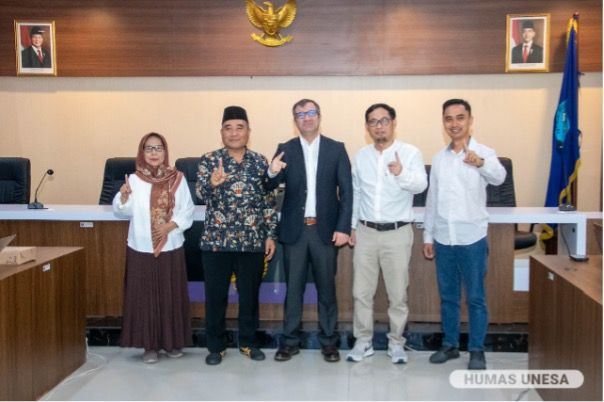
Experts from The Education University of Hong Kong (EdUHK) emphasized various important things related to leadership, teaching quality, social justice in front of FIP UNESA lecturers.
Unesa.ac.id. , SURABAYA—In order to improve the quality of the tridharma of higher education and realize Sustainable Development Goals (SDGs) or Sustainable Development Goals (TPB), Study Program Bachelor of Education Management (MP), Faculty of Education (FIP), UNESA again held visiting professor #2 in Meeting Room O1 FIP Building, on Monday, December 9 2024.
This activity carries the theme "< em>Future Focused Research: Educational Management and Leadership in Higher Education Institutions to Enhance the Achievement of the SDGs” which was attended by Assoc. Prof. Sedat Gumus from The Education University of Hong Kong (EdUHK), as resource person.
Mochamad Nursalim, Dean of FIP UNESA explained that this activity has an important role in supporting the achievement of the SDGs. This shows the collaborative commitment of FIP UNESA in developing sustainable education, while making a real contribution to the global agenda, SDGs.
"Hopefully in this way, apart from strengthening FIP synergies on an international scale, it can also increase the capacity of the good community both lecturers and students in teaching, research and publications," said the UNESA professor of individual counseling.
UNESA Director of Educational Transformation and Learning Technology (TPTP), Fida Rachmadiarti in her speech highlighted the importance of quality implementation education, innovative research, and transformative leadership to create a positive impact on the welfare of society.
"This activity is a focus on how we can improve the quality of education and prepare students and lecturers with the main skills needed now and in the future," said the professor at the Faculty of Mathematics and Science (FMIPA).

Left to right: Director of TPTP, dean of FIP, visiting professor resource person, deputy dean II of FIP, and UNESA MP Undergraduate Study Program Coordinator.
Bachelor of Education Management Study Program Coordinator , Syunu Trihantoyo said, this visiting professor is the second time or second year, part of a series of the 2024 Independent Campus Competition Program (PKKM), funded by the Ministry of Education, Culture, Research and Technology (Kemendikbudristek) or the Ministry of Higher Education, Science and Technology (Kemendikti Saintek).
He explained that this activity was one of the study program's concrete steps in increasing the capacity of lecturers and students, especially in research and publication in the field education management.
"Through this activity, hopefully lecturers and students can develop new insights, expand international academic networks, and improve the quality of research and publications in the field of education," he explained.
At that opportunity, Sedat Gumus explained about social justice in relation to education. According to him, social justice is a values-based concept that emphasizes that every individual has the same right to access resources and opportunities in society, including access to education.
An important tool for building a just society by providing equal life opportunities for all children and educate them to create a more just world.
According to him, there are still inequalities in educational opportunities related to students' socio-economic background. He showed that UNESCO data on senior secondary education completion rates and students' reading achievements were greatly influenced by the economic conditions of their families.
He also emphasized the importance of leadership in education that acts as an agent of justice social. The role of educational leaders must be to be able to detect inequalities and create culturally responsive policies and practices to reduce marginalization.
In one of his studies, Sedat Gumus found that dialogue between school leaders and teachers had a positive impact in reducing gaps in learning outcomes, especially in schools with low socio-economic composition.
“Leadership school is important. School leaders are important educationally. "They make a difference in building a fairer and more inclusive education system," he concluded.
As the moderator noted in conclusion, this activity is a strategic step for UNESA in supporting the achievement of the SDGs, especially related to quality education (SDG-4) and reducing inequality (SDG-10). Through this visiting professor, UNESA continues to be committed to becoming a university that contributes to sustainable development and social justice.[*]
***
Reporter: Mochammad Ja'far Sodiq (FIP) and Fionna Ayu Shabrina (FMIPA)
Editor: @zam*
Photo: UNESA PR Team
Share It On:






